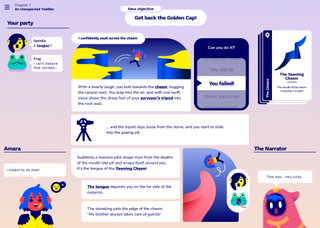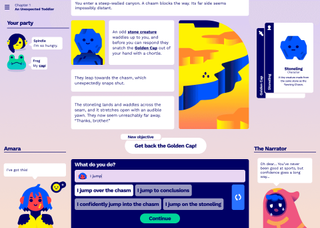Creator of AI game Hidden Door: 'I don't think AI is innately evil—I think what we're arguing about is who gets to benefit'
Hidden Door co-founder and CEO Hilary Mason on how her AI-narrated RPG works, and the ethics of machine learning.
Attempts to bolt generative AI onto existing videogames have so far been novel and funny, but haven't exactly felt like glimpses of the future. One company has been building an AI game engine since 2020, however, and they might genuinely be onto something. It's called Hidden Door, and the pitch is this: a "story engine" which narrates endless co-op RPG campaigns set in popular fictional worlds licensed from their authors.
I first met with Hidden Door co-founder and CEO Hilary Mason at GDC in March, and for today's PC Gaming Show, we interviewed Mason again at Hidden Door's office in New York. The video above is a longer version of the interview that appeared in the show. In it, Mason describes how Hidden Door's custom-built AI system works and how the company hopes to come out on the right side of emerging debates over AI ethics, which Mason says comes down in part to who's benefiting from the technology.
Before I get to the ethical questions, it helps to know basically what Hidden Door is and how it works. I relayed Hidden Door's workings in more detail back in March, but here's the gist:
- The basic storytelling unit in Hidden Door is a "trope," a scenario frequently encountered in a certain genre, such as a bar brawl. The custom story engine mixes tropes together on the fly to generate "whatever makes the most sense in the story at the moment," according to Mason.
- The AI narrator can follow the rules of licensed fictional worlds (eg, who can or can't die, or fall in love, or the nature of magic in the world), as well as mimic an author's writing style.
- Players type in what they want their custom characters to do and select an action from suggestions. The system uses word play to feed players ideas: type "punch," and you'll get the option to punch someone, but perhaps also to "feel punchy" or seek out fruit punch.
- One way the engine creates the "illusion of storytelling" is by working past events into the narrative: "So if you were to offend someone in the last story, and the story engine says, 'cool, we need an enemy to show up here and yell at you,' that's the person who's going to show up."
- Like tabletop RPG campaigns, the story never has to end—"the AI will never run out of content"—and your characters and the state of the world persist, but you can "win" and "lose" individual scenarios by reaching good or bad outcomes. Death can be a possibility, but "when you fail, usually it's a pretty funny experience."

Personally, my first reaction that I want to break the thing, or at least find its limits. Generative AI is particularly good at bringing out the urge to interrogate and test systems: The more spookily human-like a machine learning system behaves, the more I want to bully it into revealing that it's just a bunch of gears. But once the novelty of prodding at Hidden Door's limitations wears off, will it be any fun? If it is, I could see it really taking off. Hypothetically, would I be interested in playing an endless Star Trek: TNG adventure campaign with my friends? I would. And let's be real: Lots of D&D games peter out because no one feels like DMing anymore. It's a lot of work.
"This is not a replacement [for tabletop roleplaying]. It's just a different way to get into that kind of experience, where you don't need to have a friend who can invest all of that time," says Mason. "You don't need to buy books, you don't need to learn a whole complex set of rules. It's a different game. It has a very light ruleset. It has a language-based interface. You can just come and play whenever … It also allows you to play alone."
AI gaming ethics
Even with the assurance that the company doesn't intend for its story engine to replace human creativity, it is obvious from the public reaction to AI so far that a significant portion of its target audience is going to feel discomfort over engaging with any generative AI system due to the cocktail of ethical concerns that each is subject to.
We want writers to get paid.
Hilary Mason
"Whenever you're building an AI system, it's really important to think about how to do it ethically, and that means a bunch of different things," says Mason. "It means, 'Is your data sourced ethically? Does your system magnify biases in the underlying data? Are you accounting for that? Are you controlling for that? Are you making sure there are levers in your product where people who might experience something can report it?'
The biggest gaming news, reviews and hardware deals
Keep up to date with the most important stories and the best deals, as picked by the PC Gamer team.
"We've been very thoughtful about this for a very long time at Hidden Door, and we do our best to be very clear, transparent, to have ethically-sourced data, to think about our player experience and make sure that they are safe and that they are always able to see themselves safely reflected in the stories that are being told."

When I spoke to Mason at GDC, she said that a large language model trained on publicly available internet text was part of Hidden Door's overall AI makeup—which on its own might be unacceptable to some—but that the meaningful output of the system comes from models they built with their own work, public domain stories, and material they've licensed.
I think what we're arguing about is who gets to benefit, and we really want to see the writers, the creators, benefit from [AI].
Hilary Mason
"We work with writers," Mason says in PC Gaming Show interview above. "We want writers to get paid. We see what we do as a way of giving writers access to the technology that takes the work they've already done—all of that world building, all of that imagining, all of that writing—and then gives them another way to share that with their fans where they get paid more for the work they've already done. We're really excited to work with writers.
"And personally, I know this is controversial, but I don't think AI is innately evil. I think what we're arguing about is who gets to benefit, and we really want to see the writers, the creators, benefit from it. And that's why we're doing this the way we're doing it."
Mason says the company is already working with authors and "folks who make some really exciting TV shows and other media" to create adventure settings based on their worlds, but Hidden Door's first game world will be based on a public domain story: The Wonderful Wizard of Oz, published in 1900.
Hidden Door will be available to try this winter, and will be free to play. If you're interested in an early preview, you can sign up for updates on the Hidden Door website.

Tyler grew up in Silicon Valley during the '80s and '90s, playing games like Zork and Arkanoid on early PCs. He was later captivated by Myst, SimCity, Civilization, Command & Conquer, all the shooters they call "boomer shooters" now, and PS1 classic Bushido Blade (that's right: he had Bleem!). Tyler joined PC Gamer in 2011, and today he's focused on the site's news coverage. His hobbies include amateur boxing and adding to his 1,200-plus hours in Rocket League.
Most Popular

